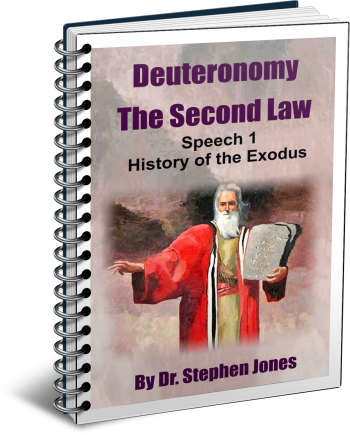Latest Posts
View the latest posts in an easy-to-read list format, with filtering options.

A commentary on the first speech of Moses in Deuteronomy 1-4. The book of Deuteronomy is a series of 12 speeches that Moses gave just before his death at the end of Israel's wilderness journey.
Category - Bible Commentaries

Deut. 4:32 and 33 Moses asks,
32 Indeed, ask now concerning the former days which were before you, since the day that God created man on the earth, and inquire from one end of the heavens to the other. Has anything been done like this great thing, or has anything been heard like it? 33 Has any people heard the voice of God speaking from the midst of the fire, as you have heard it, and survived?
It is plain that this was a one-time event. God spoke audibly to the whole nation of Israel. Normally, divine communication is more subtle, as He speaks from within our hearts. But He understood that most of the people were dull of hearing. To be sure that everyone heard His voice, so that they were all without excuse, He had to speak audibly.
It was also believed in those days that God remained aloof from men, and if anyone came into direct contact with Him, they would die. The holiness of God was seen in contrast to the sinfulness of men. God was thought to be distant and impersonal, needing no man and desiring no man's fellowship, but expecting obedient servants. Certainly, the idea that we might transcend servanthood and become the Sons of God was incomprehensible to them.
This mindset ought to have been greatly eroded when God came down upon the mount to speak audibly and directly to every man, woman, and child—great or small—to relate personally with each one as if they were important to Him. Years later, He came again in the Person of Jesus Christ, so that they might know the character of God and see His glory.
34 Or has a god tried to go to take for himself a nation from within another nation by trials, by signs and wonders and by war and by a mighty hand and by an outstretched arm and by great terrors, as the Lord your God did for you in Egypt before your eyes? 35 To you it was shown that you might know that the Lord, He is God; there is no other besides Him.
This, too, was unique in history, but God did these mighty acts in order to establish the divine plan with His “church in the wilderness” (Acts 7:38). Each major event was commemorated yearly by a feast day, because the sequence of such festivals revealed the plan of salvation from our justification by the blood of the Passover Lamb, to our sanctification through hearing His voice at Pentecost, and finally to our glorification through the feast of Tabernacles.
When God established a personal relationship with Israel, the Israelites became His children (Exodus 4:22). This meant that God took upon Himself the role of Father, and as such He assumed the right to discipline His children. This discipline of the law was not conducted by an impersonal Judge, but by a loving Father.
36 Out of the heavens He let you hear His voice to discipline [yasar] you; and on earth He let you see His great fire, and you heard His words from the midst of the fire. 37Because He loved your fathers, therefore He chose their descendants after them. And He personally brought you from Egypt by His great power, 38 driving out from before you nations greater and mightier than you, to bring you in and to give you their land for an inheritance as it is today.
Hearing God's voice is not only meant to guide us in our daily walk, but also to discipline us to follow the path of our calling so that we may arrive at our destiny. The Hebrew word yasar means to chastise, discipline, instruct, or admonish.
Hearing and obedience are the same Hebrew word as well (shema). The purpose of hearing is not merely to have a personal conversation with God, but to bring about obedience through discipline. If we do not obey His voice, we may be instructed by a corrective interview. God can raise up many agents on earth to make us uncomfortable and provide such instruction.
Moses made the connection between God's voice and the “great fire.” The “fiery law” (Deut. 33:2) is the voice of God that brings revelation, discipline, and instruction in order to bring about obedience. The judgments of the law, then, define the “fire” in terms of its discipline and correction. This “fire” is designed to burn “the flesh,” that is, our fleshly tendencies and desires, but it is rooted in the love of God, as Moses says in verse 37.
God's “fiery law” was given to Israel “because He loved your fathers,” Moses says. This hints at the concept of the Fatherhood of God, which men barely understood in those days. The Israelites were God's children, and their Heavenly Father was providing them with much needed instruction, correction, and discipline in order to bring them to their destiny in Christ.
39 Know therefore today, and take it to your heart, that the Lord, He is God in heaven above and on earth below; there is no other. 40 So you shall keep His statutes and His commandments which I am giving you today, that it may go well with you and with your children after you, and that you may live long on the land which the Lord your God is giving you for all time.
Because there is only one God, we are told to be obedient to Him by obeying Him. No other lawgiver has the right to contradict a law of God and then expect obedience from men. Men and governments have sorely tested this command over the millennia, but this is the first and foremost principle of a Christian believer.
So ended Moses’ first speech to the Israelites.